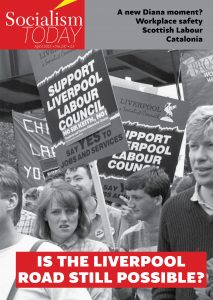
Keir Starmer launched the Labour Party’s campaign for the May local and mayoral elections in England on March 11 by majoring on Boris Johnson’s plan for a 1% rise-but-real-terms-pay-cut for nurses and other NHS workers.
This line of attack on the Tories was chosen even though, as the BBC report archly put it, “NHS pay for England is decided nationally, rather than by councils”.
Yet even then, on his chosen field, Starmer avoided media questions about whether he would join nurses on a picket line or what he felt would be an appropriate pay rise, other than saying that the 2.1% previously agreed in 2019 would be ‘a good starting point’.
But what about the council elections? A National Audit Office (NAO) report had been released the previous day showing that 94% of English local authorities expect to cut spending in the year ahead after the hit to their finances from the Covid pandemic. Yet nothing was said on what Labour-led councils would do under Starmer to resist the coming turbo-charged austerity against local public services.
Read more